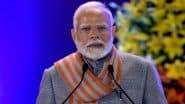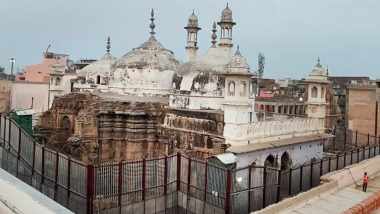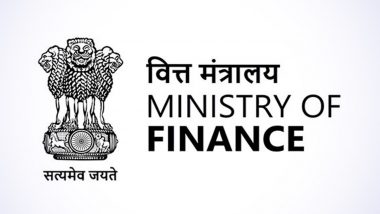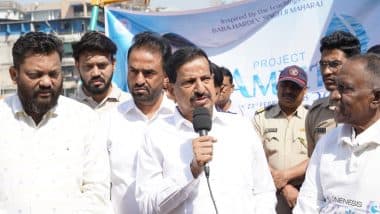Mumbai, May 23: The Varanasi District Judge Dr. AK Vishvesha on Monday began the hearing of the civil suit in the Kashi Vishwanath temple-Gyanvapi mosque case. Interestingly, only 16 people have been allowed inside the courtroom.
This hearing comes after the Supreme Court of India transferred the Gyanvapi mosque case to the district court in Varanasi on May 20, 2022. Gyanvapi Masjid Row: Security Beefed Up in Varanasi Ahead of Case Hearing in District Court.
What is the Gyanvapi Masjid dispute all about?
The Gyanvapi Masjid case can be traced back to 1991- a year before the Babri Masjid demolition took place when a group of local priests filed a suit in the Varanasi Civil Court seeking permission to worship in the Gyanvapi Mosque Complex. The priests in their plea claimed that the Gyanvapi mosque was built on the demolished portion of the Kashi Vishwanath Temple by Mughal Emperor Aurangzeb in the 17th Century. The plea sought to bypass the Places of Worship (Special Provisions) Act, 1991, which was already in force by then.
Check tweet:
𝐆𝐘𝐀𝐍𝐕𝐀𝐏𝐈 𝐌𝐎𝐒𝐐𝐔𝐄: 𝐏𝐀𝐒𝐓 𝐂𝐎𝐍𝐓𝐄𝐒𝐓𝐄𝐃, 𝐅𝐔𝐓𝐔𝐑𝐄 𝐓𝐄𝐍𝐒𝐄#GyanvapiMosque #GyanvapiMasjid pic.twitter.com/nQacvQun5V
— IANS (@ians_india) May 21, 2022
Gyanvapi Masjid Case: A timeline of events that unfolded since 1991
- In 1991, three local priests from Varanasi filed a petition seeking permission to pray in the Gyanvapi mosque premises. The petitioners claimed that the Gyanvapi mosque was built by Emperor Aurangzeb by demolishing a part of the Kashi Vishwanath temple during his reign.
- In 1936, three Muslim petitioners demanded that the entire Gyanvapi mosque complex be declared a part of the mosque. While seven witnesses were produced on behalf of the claimants, the British government produced 15 witnesses.
- Thirty years later in 2021, the Allahabad High Court stayed proceedings in the Kashi Vishwanath Mandir-Gyanvapi Masjid case in a Varanasi court, thereby suspending a controversial archaeological survey of the premises to determine whether a Hindu temple was partially razed to build the 17th-century mosque.
- In March 2021, the bench of the Supreme Court headed by the then Chief Justice of India, S.A. Bobde, agreed to examine the validity of The Places of Worship Act.
- The Gyanvapi masjid case controversy was ignited once again when five Hindu women knocked on the doors of the court in 2021 seeking to worship the Shringar Gauri and other idols that were present within the Gyanvapi mosque complex.
- In April 2022, a Varanasi court ordered a video survey of the Gyanvapi mosque complex after the petition. A videography survey of the Gynvapi masjid complex began which continued for three days. During the survey, a Shivling was reportedly found inside the temple complex. After the shivling was found, the Muslims dismissed the claim and said it was only a 'fountain'.
- On May 19, 2022, the Supreme Court asked the Varanasi court to not proceed with the Gyanvapi Masjid case till May 20. The apex court agreed to hear the Gyanvapi mosque case on May 20, 2022.
- In its verdict, the apex court said that the interim order issued on May 17 for protection of the "Shivling" and allowing access to Muslims to offer prayers at the mosque will continue. It also transferred the Gyanvapi mosque case to the district court in Varanasi observing that a "more seasoned hand" should deal with the case.
The Varanasi court which began the hearing in the Kashi Vishwanath temple-Gyanvapi mosque case adjourned the hearing for today. The court will announce the final order on May 24.
(The above story first appeared on LatestLY on May 23, 2022 03:53 PM IST. For more news and updates on politics, world, sports, entertainment and lifestyle, log on to our website latestly.com).













 Quickly
Quickly
























